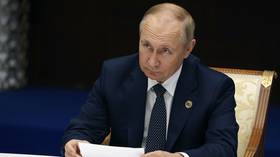EU sends monitors to Russian ally

The EU is deploying dozens of monitors to Armenia, after deadly border clashes with Azerbaijan, the bloc’s top diplomat, Josep Borrell has confirmed.
Brussels is sending up to 40 observers “to build confidence” after recent hostilities, the EU’s high representative for foreign affairs announced, according to a statement released on Monday by the European Council.
“This is another proof of the EU’s full commitment to contributing to the ultimate goal of achieving sustainable peace in the South Caucasus,” he added.
The monitors will be stationed in Armenia and stay there for up to two months, the Council said. Some of them may be pulled out of Georgia, where they are deployed on a similar observation mission. The EU pledged to make sure that its capacity in Georgia “is not impacted” by the relocation.
Armenia and Azerbaijan have been locking horns for decades over a number of issues, most prominently, the disputed region of Nagorno-Karabakh, which claims to be an independent state. In 2020, the two nations fought a 44-day war over the territory, which ended with a Russian-brokered truce and the ceding to Baku of some areas previously controlled by Nagorno-Karabakh troops.
Last month, dozens of people, both civilian and military personnel, were reportedly killed on both sides. Yerevan and Baku accused each other of triggering the escalation in violence. The Collective Security Treaty Organization (CSTO), a Russia-led defense alliance that counts Armenia as a member, sent an observer mission to the area in the wake of the clashes.
Yerevan has long been Moscow’s ally, but during the latest round of hostilities with Azerbaijan, senior Armenian officials complained about a lack of military intervention on its side. President Nikol Pashinyan noted that the CSTO should be worried about “losing Armenia,” according to local media.
Officials in the US and the EU have been offering their assistance to Armenia. During her trip to Yerevan last month, US House Speaker Nancy Pelosi claimed that Armenians “were disappointed they got fact-finders and not protection” from Moscow, suggesting Washington may be a better guarantor of security for the nation.
Kremlin spokesman Dmitry Peskov reacted to the visit by the US official, questioning whether “actions and statements as brazen as hers” helped normalize the situation and stating Moscow’s preference for “quiet” diplomacy.













